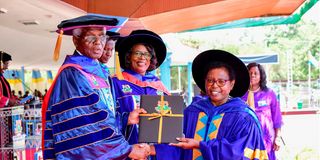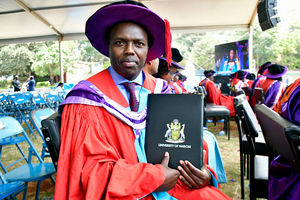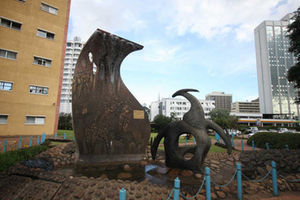
Kenyatta University Chancellor, Ambassador (Dr) Francis Muthaura hands KU PhD graduand, Susan Thami Njau, a conferment for doctorate, as Acting KU Vice-Chancellor, Prof Waceke Wanjohi looks on during the university's 56th graduation ceremony.
Becoming a professor is the pinnacle of academic achievement and is a journey that requires advanced education, consistent research output, teaching experience, and academic leadership.
It is a path that is open to professionals from various disciplines — arts, sciences, engineering, education, law, and beyond.
Kenyan universities follow a structured academic hierarchy, generally overseen by internal promotion committees and regulated by the Commission for University Education (CUE).
When one is hired by the universities, they can come in as Tutorial Fellows then move to Lecturer, Senior Lecturer, Associate Professor and then Professor (Full), in that order.
While one can become a Lecturer without a PhD, the downside of that is that it limits the person to just lecturing as they cannot supervise students.
As such, the PhD is an important degree when joining the academia as it means you will be able to supervise master’s students meaning that it contributes to your mobility up the ranks.
To become as Senior Lecturer, a person must have a PhD, supervised a minimum of 3 students and published papers done alone or collaboratively with others.
While universities have different standards for promoting academic staff, the common thread is that the parameters are set by the institution’s Senate and approved by the Council.
In 2021, the Universities Academic Staff Union (UASU) challenged and won in court a case against an an attempt by the CUE to introduce a harmonized criteria for appointments and promotion of university academic staff across the universities. As such Kenyan universities reverted to developing and applying their own internal criteria for academic appointments and promotions.
The promotion is based on a points system covering teaching, research, publication, mentorship, academic service, and community engagement. For example, at the University of Nairobi (UoN), for a Senior Lecturer to be elevated to Associate Professor, the individual ought to have scored 32 out of 50 points in research and publication, 12.5 out of 25 points in teaching and instruction and five out of 10 points in industry.
Further, the person ought to have scored four out of 10 points in administration and two out of five points in community engagement to cumulatively score a minimum of 55.5 points out of the possible 100.
As Senior Lecturer, you are supposed to in addition to supervising more master’s students (minimum of 5) you have also supervised PhD students to become Associate Professor.
The title of Professor is conferred by the University Council, based on recommendations from faculty boards, external assessors, and promotion committees.
So the journey to being a Professor is completely individual such that an individual’s runs their own race at their own pace, which explains why certain departments may have very few Full Professors.
There are also the monetary benefits that come with the various elevations.
The Salaries and Remuneration Commission (SRC) has set the basic monthly salary for a Professor at between Sh209,694 and Sh283,087 while that of an Associate Professor is between Sh180,337 and Sh250,668. They are also entitled to various allowances like commuter, house allowance, book allowance and transfer allowance.
The basic monthly salary for a Senior Lecturer ranges between Sh144,450 and Sh206,563, highlighting the paycheck disparities among senior academic staff.








